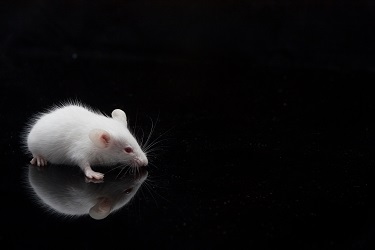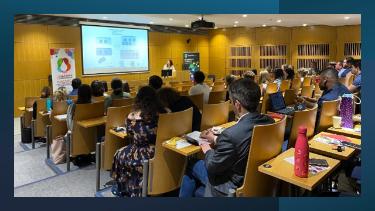SBI Down Under
I am an EMBL Australia Group Leader at the South Australian Health and Medical Research Institute (SAHMRI) and at the College of Medicine and Public Health at Flinders University, both in Adelaide, South Australia (SA). SAHMRI is South Australia’s only independent medical research institute and hosts more than 700 researchers working on a broad array of discovery and translational projects including in precision medicine and cancer, lifelong health, early-life and maternal health, and aboriginal health. As well as being an EMBL Australia Group Leader, I’m also the Director of the Computational and Systems Biology Program (which is like a department/division in the institute’s structure) and am the founding Scientific Director of the SA Genomics Centre (SAGC), which is a State-wide genomics and bioinformatics platform supporting researchers in SA, nationally and even internationally. The SAGC is a partnership between SAHMRI, the 3 Universities in SA, a national genomics provider (AGRF) and the Australian Wine Research Institute, which is also based in Adelaide.

What has any of this got to do with you and SBI? Just before the COVID-19 pandemic hit, I was appointed as an Honorary/Adjunct Investigator at Systems Biology Ireland, having collaborated with Walter Kolch and several other SBI researchers for a number of years especially on the PRIMES project to map the EGRF network in colorectal cancer cells. This collaboration started in Ireland (I am originally from Wexford and did my PhD at UCD) before I moved to Adelaide in 2014. Unfortunately, very strict border controls in Australia over the course of the pandemic have meant that I haven’t been able to visit SBI since, but now that the borders have re-opened, I hope to be able to spend time at SBI later this year and build new collaborations with as many of you as possible. In the meantime, Walter and Maryann asked if I would write a blog piece and I thought I would do this one introducing myself and some of the work we’ve been doing over the course of the pandemic (not being able to go anywhere but essentially having no community transmission in SA, has meant that we have been very productive). I hope you find this overview interesting and I am super keen to build stronger links with SBI and UCD researchers more broadly. As borders open up, there will be lots of opportunities for students and postdocs to do research placements Down Under (we currently have 4 Irish people in the group, including myself). Did I mention that SA has miles and miles of fantastic beaches and some of the best wine regions in the world – just ask Walter!

More about the Lynn Group:
My group consists of a highly diverse team of ~10 postdocs, research assistants, PhD and MSc students (with ~ another 10 staff in the SAGC). We predominantly apply systems immunology approaches to investigate how microbes (pathogenic and commensal) modulate the immune system in a range of contexts from infant immunisation to cancer immunotherapy, but we also collaborate widely in the cancer systems biology area as many of the approaches are broadly applicable to both fields. Our research spans from computational modelling and bioinformatics software development to preclinical mouse models (including germ-free mice) and clinical studies/trials.
Given our focus, in the last two years, we have unsurprisingly focused a lot on SARS-CoV-2 infection and vaccines. For example, we very recently published a deep multi-omics analysis of the peripheral immune system in mild-critical patients recovering from SARS-CoV-2 infection at a serological, cellular and transcriptomic level. We uncovered long term immune dysregulation in convalescent patients out to six months post-infection and found significant differences in the transcriptome of convalescents referred to a long COVID clinic compared to those who were not. These differences indicated a persistent but mild thrombocytopenia in convalescents suffering from long COVID, suggesting potential new treatment strategies for long COVID patients.
Another major area of interest of mine is on vaccine non-specific effects – the ability of some vaccines to provide protection against other unrelated infections. We have been working on this area in pre-clinical models for several years and were awarded >$880K in funding in November last year from the Australian National Health and Medical Research Council. Over the last two years, I have also had the real honour to be the Principle Investigator in South Australia for the international BRACE randomised controlled trial, which is investigating whether BCG provides non-specific protection against SARS-CoV-2 in >6800 healthcare workers worldwide. My team has coordinated the trial together with our fantastic clinical collaborators at the Royal Adelaide and Women’s and Children’s Hospitals in SA and my lab processed all the bloods collected from participants in SA at 0, 3, 6, 9 and 12 months post randomisation. Blood processing was extensive for the plethora of subsequent assays that are now being carried out on different fractions. A protocol paper has recently been published in BMJ Open if you’d like to know more about this study.
Also in the COVID-19 area, my team established a clinical observational study in 2021 called COVIRS, which has collected bloods from >100 participants receiving the Pfizer or AstraZeneca COVID-19 vaccines. Uniquely, this study has collected bloods shortly after the first, second and third doses of vaccine and a multi-omics approach is currently being applied to understand differences in initial innate immune responses to vaccination and associations with both vaccine immunogenicity and reactogenicity.
As mentioned, a major interest of mine in the last number of years is on host-commensal interactions and we have published a number of important studies in this area over the last two years, including new discoveries providing new insight into the influence of the gut microbiota on mammalian longevity, vaccine responses and cancer immunotherapies (Cell Reports 2021; Nature Reviews Immunology 2021; Cell Reports Medicine 2021). These recent discoveries have already led to an international patent application, an NHMRC funded clinical study in infants (The AIR study), and a funded collaboration with a major international vaccine company. Recent (2021) Medical Research Future Fund funding (~$1.3 million) will see us expand our work on host-microbiota interactions into the area of acute lymphoblastic leukemia (ALL) in close collaboration with Prof. Deb White’s Group at SAHMRI. This will involve metagenomics analysis in patients and the development of unique preclinical germ-free mouse models colonised with a human patient microbiota to investigate both effects on responses to treatment and to assess whether dysregulation of the gut microbiota plays an important role in the long-term poor health outcomes of ALL survivors. Ultimately, we want to integrate data on the microbiota with other omics and clinical data to better predict ALL patient outcomes (immediate and long term) and to stratify patients to the optimal treatments. In the cancer immunotherapy space, we have recently discovered in pre-clinical models that targeting the microbiota is an effective approach to overcome the significant immuno- and hepato-toxicity induced by immune agonist antibody (IAA) immunotherapies, without compromising anti-tumour efficacy alone or in combination with immune checkpoint inhibitors (ICI) (Cell Reports Medicine 2021). We believe our discovery opens the door to using IAAs to sensitise immunologically cold tumours to ICIs without significant immunotoxicity. To investigate this further, we have partnered with Dr. Susan Woods at SAHMRI, using her advanced orthotopic model of microsatellite stable colorectal cancer.
I hope you’ve found this overview interesting - there’s lots more going on in the lab that I haven’t been able to cover. We are always interested in new collaborations in these areas so please don’t hesitate to reach out to me anytime to have some exploratory discussions.

